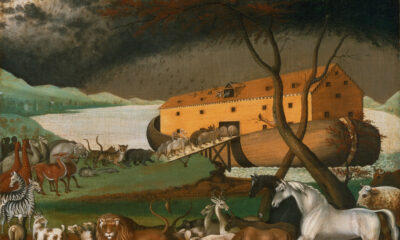Faith
Nigerian Christians Face Deadly Persecution
Faith Facts
- Boko Haram, Islamic State affiliates, and Fulani militant herders have carried out assaults on Christian communities in Nigeria.
- Efforts to hold the Nigerian government accountable include proposed U.S. legislation urging action against religious persecution.
- Advocacy groups and religious leaders highlight a pattern of targeted violence, with over 52,000 Christians killed and 20,000 churches attacked since 2009.
As believers around the world join in prayer for the persecuted church, Nigerian Christians continue to suffer brutal attacks at the hands of extremists. Government officials have pushed back against claims of genocide, even as pressure increases for accountability.
Servants of Christ are raising their voices to bring attention to the plight of innocent men, women, and children whose only crime is proclaiming the name of Jesus.
The Nigeria Religious Freedom Accountability Act was introduced by Senator Ted Cruz, calling for U.S. measures to address the hostile atmosphere for believers in Nigeria.
Additionally, a petition from leading religious liberty advocates urges the U.S. government to place Nigeria back on the “Country of Particular Concern” list due to ongoing religiously motivated violence.
“The Nigerian government is directly violating religious freedom by enforcing Islamic blasphemy laws that carry the death penalty and harsh prison sentences against citizens of various religions.”
“It also demonstrably tolerates relentless aggression uniquely against Christian farming families by militant Fulani Muslim herders, who appear intent on forcibly Islamizing the Middle Belt.”
Fulani militant herders present the gravest danger to Christian families in Nigeria’s central region according to these advocates, aiming to seize land and erase longstanding Christian communities.
Churches across the nation stand firm, even as attackers destroy homes and farmland, driving believers to seek refuge in makeshift camps with scarcely any government support.
Despite numerous warnings, government forces often fail to respond to the looming threat, leaving faithful families vulnerable and without protection.
“The biggest threat facing Nigeria’s Christians comes from Fulani Muslim herders.”
“With cries of ‘Allahu Akbar’ and wielding AK-47s, they invade peaceful Christian farming areas in Nigeria’s central region, massacring families, burning homes and harvests, and driving millions of Christians from their ancestral lands.”
The surrounding political climate frequently downplays the religious root of these assaults, attributing violence to resource disputes rather than acknowledging the clear targeting of followers of Christ.
In heartfelt testimony, Bishop Wilfred Anagbe described his people as a church under extermination by Islamist forces.
“The experience of Christians in Nigeria can be summed up as a church under Islamist extermination.”
Nigerian Christians need our faithful prayers, advocacy, and unwavering commitment to the principles of liberty, just as our Lord calls us to stand with the persecuted. May we never forget those suffering for their faith in Christ.
Faith
Hope for Nigerian Christians Amid New US Action
Faith Facts
- Christian persecution in Nigeria has continued for decades, with believers facing violence and discrimination.
- The US has designated Nigeria as a Country of Particular Concern due to systematic violations of religious freedom.
- Christian communities suffer from terrorism, biased laws, and insufficient governmental protection.
After many years of advocacy, the United States has officially recognized the serious threats faced by Christians in Nigeria.
This move brings renewed attention to the suffering endured by faithful believers, who have long been targeted by extremist violence and government neglect.
Organizations devoted to religious liberty have consistently warned about attacks against Christian communities in Nigeria.
They highlight years of hardship and unrest.
“Christianity is facing an existential threat in Nigeria.”
American leadership’s decision to classify Nigeria as a Country of Particular Concern underlines the urgency of defending religious freedom according to the standards set by the US International Religious Freedom Act.
This recognition follows a tragic history.
Since 2009, terrorists such as Boko Haram and their affiliates have targeted both Christians and, more recently, other groups in northern and central Nigeria.
The violence has resulted in widespread death and displacement.
A group known as the Fulani militia has especially singled out Christian farming communities.
The violence has worsened due to ineffective or complicit government response.
The presence of Sharia laws in twelve northern states has further marginalized Christians.
These laws restrict places of worship and have encouraged abductions and forced conversions of young girls from minority backgrounds.
Advocates stress that these grave injustices demand faithful attention, prayer, and action rooted in Biblical principles and a commitment to justice.
“We hope, pray and trust that this time the CPC designation will mark a definitive step towards ending this suffering.”
As Christian citizens, it is vital to stand in prayerful support of our brothers and sisters in Nigeria.
We should advocate for policies that protect the right to worship without fear and uphold the dignity of all God’s children.
Faith
Hollywood’s Challenge to Biblical Integrity
Faith Facts
- The Carpenter’s Son is based on the apocryphal Gospel of Thomas, which no Christian tradition holds as Scripture.
- Hollywood is releasing this “biblical horror” film starring Nicholas Cage, portraying a distorted view of Jesus’ childhood.
- The Church historically rejects the Gospel of Thomas, aligning instead with the 66 true books of the Bible.
Hollywood’s choice to adapt an apocryphal text, ignored by the Church for centuries, signals more than creative license—it tests Christian boundaries. The Gospel of Thomas, filled with stories contrary to Jesus’ true character, undermines Biblical truth in favor of sensationalism.
There are many authentic and powerful Biblical narratives suited for film that honor faith and inspire believers. Choosing a source like the Gospel of Thomas disrespects Scripture and provokes unnecessary controversy among Christians.
“Both testaments warn believers away from the occult and Philippians urges us to think on things which are ‘pure, lovely, commendable…’”
Director Lofty Nathan’s attempts to defend his film by referencing his Orthodox Church upbringing and Christian art traditions fail to justify this project. Using participation in Christian culture as a child does not legitimize a work that challenges the faith’s core doctrines.
Christians are called to engage the culture but also to defend the truth with courage and conviction. We must protect our sacred stories and champion films that honor God’s Word and point to Christ, the true source of faith and salvation.
If you stand for Biblical integrity and Christian values, let your voice be heard in both prayer and conversation. Challenge Hollywood’s narratives with unwavering faith and trust in God’s Word.
Faith
Global Report Reveals Bible Engagement Challenges
Faith Facts
- The new Patmos Typology Report explores the influences shaping how people worldwide interact with the Bible, analyzing data from 85 countries and territories.
- Findings show that faith remains important globally, but Bible ownership and regular use vary widely, with some regions facing significant barriers such as low literacy, economic hardship, or rising secularism.
- The study calls for renewed strategies, like relationship-based outreach, creative storytelling, and digital tools, to help God’s Word reach hearts across diverse cultures and environments.
The Patmos Typology Report, developed by the Bible Society and United Bible Societies alongside Gallup’s data, offers a deep look at how Scripture is valued and accessed around the globe.
This extensive research highlights that while the majority of people believe in God or a higher power, the practice and impact of faith changes dramatically across regions, cultures, and generations.
Cluster 1 features Christians as minorities in mostly Muslim countries with few resources—here, only 3% own a Bible, yet 94% say faith guides their daily lives.
Efforts to strengthen Bible engagement emphasize oral and youth-focused programs that foster connection and hope.
In Cluster 2, mostly Central and Eastern Europe, Christianity’s influence is slipping among the young, with just 59% seeing faith as important and only 9% reading the Bible weekly.
The report encourages personal relationship-building and restoring trust as pathways for renewal in these regions.
Cluster 3 represents majority-Muslim and economically developed societies where Christians stand strong amid challenges.
Despite restrictions, half of people in this cluster say religion matters deeply, and church communities seek digital and discreet ways to nurture faith.
Latin America and the Philippines make up Cluster 4, where Christianity remains culturally significant but faces growing secular influence.
Enthusiasm for Scripture persists, with 74% owning a Bible and strategies focusing on connecting the Word with everyday struggles and family values.
Cluster 5 covers the secular West, encompassing places like the US, UK, and Germany, where Bible ownership is high but use is declining.
Churches are turning to creative media and digital resources to reach younger generations who remain spiritually curious but skeptical of institutions.
Cluster 6—stretching across diverse Asian nations—reflects a context where awareness of the Bible is low and Christianity is a minority.
Long-term investments in education and digital innovation are needed to equip believers as witnesses to God’s hope.
Wherever believers live, the family of faith must look for new ways to share God’s Word and stand strong for biblical truth in a changing world. To learn more, read the full report below.
-

 Self-Reliance7 months ago
Self-Reliance7 months agoTrump’s Bold Move Uncovers Massive Social Security Fraud
-

 News8 months ago
News8 months agoGovernor Walz’s Rhetoric Sparks National Controversy
-

 Faith7 months ago
Faith7 months agoNew Clues Emerge in Noah’s Ark Mystery
-

 Family8 months ago
Family8 months agoTexas Lawmaker Targets Furries in Schools
-

 News7 months ago
News7 months agoMel Gibson’s ‘The Passion of the Christ’ Sequel Title Announced
-

 Freedom8 months ago
Freedom8 months agoMaine Lawmaker Challenges Sports Fairness Controversy
-

 Family5 months ago
Family5 months agoCanada’s Controversial Policy Sparks Ethical Debate
-

 Faith6 months ago
Faith6 months agoMassive California Baptism Bash Shatters Records, Ignites Thousands!

